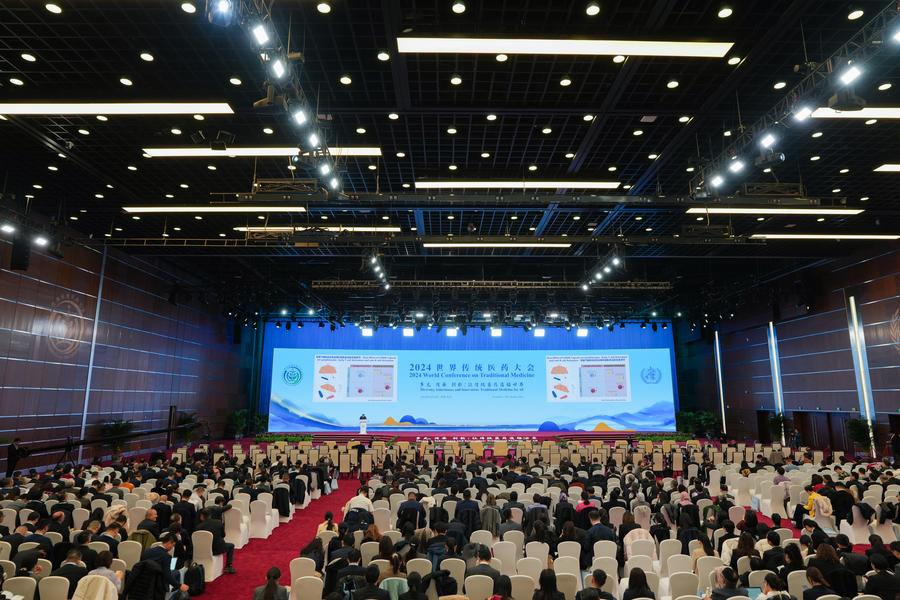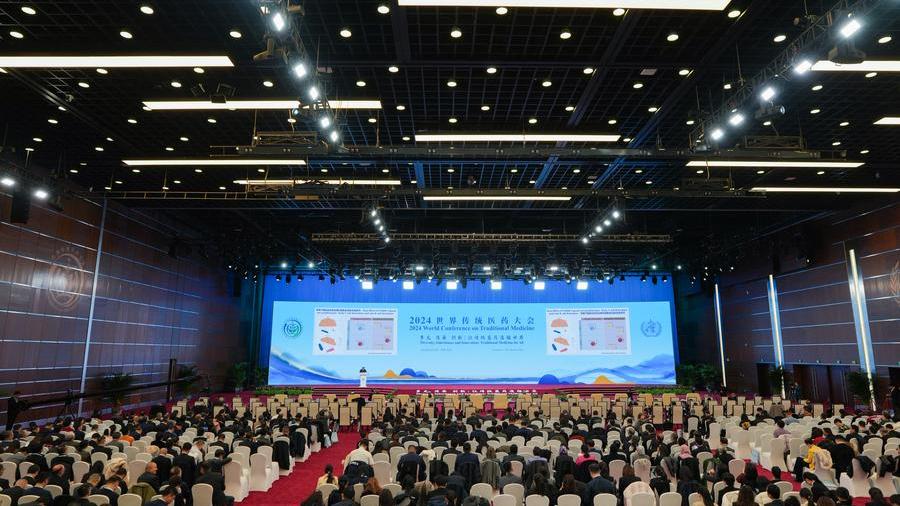
This photo taken on Dec. 3, 2024 shows the plenary session of the 2024 World Conference on Traditional Medicine in Beijing, capital of China. The conference kicked off Tuesday in Beijing under the theme "Diversity, Inheritance and Innovation: Traditional Medicine for All." (Xinhua/Ju Huanzong)
BEIJING, Dec. 6 (Xinhua) -- Efficacy, safety and quality are of key importance for the further global spread of traditional medicines, experts said at a conference in Beijing this week.
Acknowledging significant achievements in recent years, global experts attending the 2024 World Conference on Traditional Medicine highlighted the importance of a holistic approach in future endeavors that takes into account quality-related research, standards and testing.
Xiao Xiaohe, director of the traditional Chinese medicine (TCM) institute under the General Hospital of the People's Liberation Army in China, cited the Chinese success in diffusing safety concerns over TCM overseas.
China has proposed new ways of understanding TCM toxicity, Xiao said, whereby the causes are due to: the inherent properties of some herbs; the idiosyncratic susceptibility of some groups; and pharmacological activities or the mixed use of medicinal products.
"After years of research and practice, this long-time headache for the industry's global ambitions has been effectively alleviated," Xiao said.
Rudolf Bauer, chairman of the European Pharmacopoeia Committee on TCM, said that the acceptance of traditional medicine in mainstream medicine necessitates an understanding of the multi-component feature of herbal medicine.
"Many compounds will contribute to the therapeutic effect and several modes of actions will be involved," Bauer added.
Guo Dean, a professor at the Shanghai Institute of Materia Medica under the Chinese Academy of Sciences, introduced a three-pronged strategy -- deep research, holistic standards and precision testing -- to build highly effective quality-control systems.
"It is of great necessity to develop cutting-edge precision testing techniques to compensate for the inadequacy of quality standards," Guo said.
Martin Taylor, the World Health Organization representative in China, told Xinhua recently that he believes China can lead the way in developing new methods to test the safety and efficacy of traditional medicine.
Recalling his recent trip to a county in Chongqing, southwest China, where some herbs and plants are grown for TCM, Taylor said quality starts at the very beginning, in terms of ensuring the purity of the plants, and "it goes all the way through the production chain."
To further standardize TCM, China's National Administration of TCM released a three-year plan in July, setting the goal of formulating 180 domestic standards and 30 international standards for TCM by the end of 2026.
The 2025 edition of the Chinese Pharmacopoeia, a national standard and legal code, is scheduled to be released and implemented next year, according to Ma Shuangcheng, vice secretary-general of the Chinese Pharmacopoeia Commission.
In total, 28 new standards will be added, 420 existing standards will be revised, and 19 standards will be excluded, Ma said.
Shen Yuandong, chair of the International Organization for Standardization/Technical Committee (ISO/TC) 249 TCM, said that the international standardization of traditional medicines has made significant progress in recent years.
However, in the face of different laws, regulations and cultural backgrounds of various countries and regions, the question of how to further promote the standardization process and ensure the safe and effective use of traditional medicine has become one of the issues that needs to be solved for future development, Shen noted.
"Continuing to deepen research, improve the standards system, and innovate application models in combination with modern scientific and technological means will help promote higher-quality development of traditional medicines on a global scale," Shen added.
Dr. Hans Rausch with the Phytochem Referenzsubstanzen GmbH, Germany, said the establishment of the ISO/TC 249 TCM has led to a variety of international standards, greatly improving the confidence of retailers and consumers on a global scale.
At the conference, a declaration was issued that emphasizes the need to give full play to traditional medicine in universal health coverage, and stresses the importance of political commitment and policy support worldwide in this regard.




 A single purchase
A single purchase









